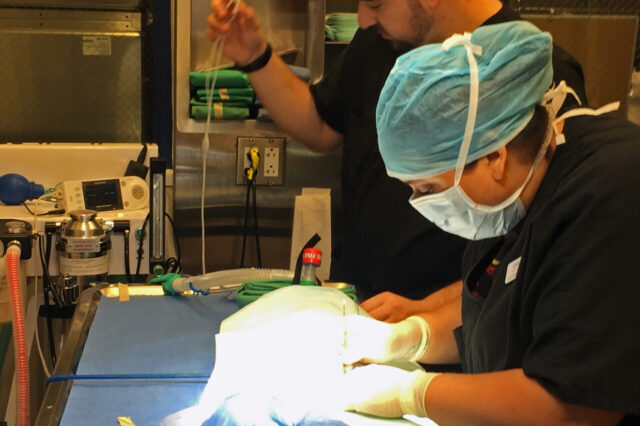UF, Miami-Dade Animal Services shelter collaboration extended after successful start

Now approaching its third year, a program to provide University of Florida College of Veterinary Medicine students with hands-on experience at a large, nationally recognized community animal shelter in Miami is drawing rave reviews from student participants and administrators alike.
On June 4, the Miami-Dade County Commission showed its resounding support for the Shelter Animal Sterilization and Population Management Clerkship, housed at Miami-Dade Animal Services, or MDAS, in Miami, by passing a resolution to continue the program for a four-year term. Previously, the agreement was continued on a year-to-year basis.
The resolution hailed the “unparalleled collaboration between the veterinary medical profession, academic veterinary medicine and the animal welfare community,” also noting that UF’s commitment to the program provides a public service to the county by assisting with spay and neuter surgeries and shelter medicine training.
The clerkship has given the college a footprint in South Florida and affords students the ability to enhance their clinical and surgical skills, help needy animals and better understand the special dynamics and issues faced by large municipal shelters — exposure that would otherwise be lacking in their training.
“Although this program is still relatively new, we have already had 76 students participate,” said Chris Adin, D.V.M., chair of the college’s department of small animal clinical sciences. “We are looking at ways to be able to better accommodate the growing number of requests we have for participation, while maintaining the ideal faculty-student supervisory balance.”
Alex Muñoz, MDAS director, said Miami-Dade’s arrangement with UF enables students to see firsthand the many rewarding aspects of working in an animal shelter, and added that their contributions assist shelter staff with the daily challenges of managing a population of up to 600 animals a day, depending on the time of year.
“Our UF student interns get to see how the largest animal shelter in the state functions,” he said. “They also get the opportunity to perform lifesaving surgeries — but they do a lot more than just that.”
Currently, up to five students are able to participate in the clerkship, which is offered in two-week periods. The visiting students are housed in an apartment near the shelter.
“The shelter’s mission is to save the lives of abandoned animals in our care, protect animals from cruelty, reunite lost pets with their owners, protect people and pets in our community from health-related issues, and ensure the public’s safety,” said Simone Guerios, D.V.M., Ph.D., a clinical assistant professor of shelter medicine at UF and clerkship supervisor for MDAS.
Guerios added that MDAS is the only open-admission shelter in the county, with an average intake of about 30,000 animals per year. The shelter operates with eight veterinarians and 30 veterinary technicians and performs about 25,000 surgeries per year as well as caring for around 400 dogs and 200 cats daily, she said.
“One of the biggest successes of our shelter is the achievement of a 90 percent live-release rate for the past four years,” Guerios said. “The collaboration we have with UF has been instrumental in maintaining this impressive rate, as well as by contributing to the training of future shelter medicine veterinarians in high standards of care and animal welfare to practice in their future professional careers.”
Students participating in the program are trained not only in the high-volume spay/neuter surgery technique; they also receive tutoring in more advanced surgical procedures, including limb amputation, wound repair, hernia repair, tumor removal and other procedures used frequently in shelter animal medicine.
“They also learn how to provide assistance in the medical care of pets that have critical conditions, such as pets that are victims of drive-by shootings or animal abuse, and pets that have neoplastic growths that require removal in order to provide them quality of life and the possibility of survival,” Guerios said.
The University of Florida College of Veterinary Medicine is supported through funding from UF Health and the UF Institute of Food of Agricultural Sciences, or IFAS.
About the author
